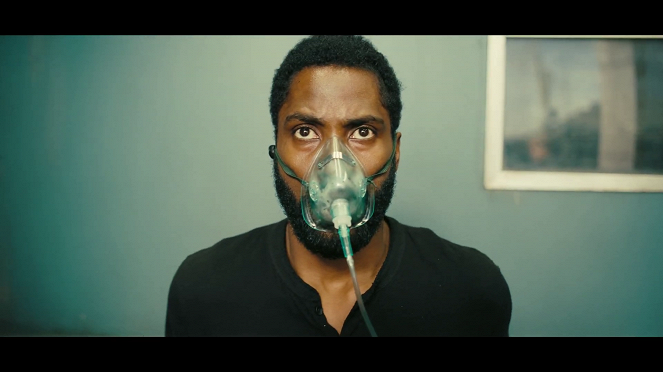Realização:
Christopher NolanArgumento:
Christopher NolanCâmara:
Hoyte van HoytemaMúsica:
Ludwig GöranssonElenco:
John David Washington, Robert Pattinson, Elizabeth Debicki, Kenneth Branagh, Aaron Taylor-Johnson, Michael Caine, Clémence Poésy, Dimple Kapadia (mais)Streaming (3)
Conteúdos(1)
Armed with only one word - Tenet - and fighting for the survival of the entire world, the Protagonist journeys through a twilight world of international espionage on a mission that will unfold in something beyond real time. (Warner Bros. US)
Vídeos (5)
Críticas (21)
Um enredo banal em que dois personagens (um homem e uma mulher com química) falam normalmente e todos os outros em cifras para isso poder ser desenvolvido, sem qualquer ilógico óbvio, num espetáculo de enredo ultra-sofisticado cheio de situações inesperadas e atrações visuais incomparáveis. Ou melhor, numa atração incomparável, quando numa tomada algumas personagens correm para a frente e outras para trás e não parece engraçado nem estranho, mas pelo contrário, parece chocante e espetacular. Nolan confessou o seu fetiche por paradoxos temporais de forma clara e sensata na A Origem, e agora está apenas a variá-lo a outros níveis teóricos e a interligá-lo com novos elementos sub-géneros (aqui, filmes Bond). E cada vez mais obscurece, finge, complica artificialmente e aumenta ao máximo para empurrar tudo ainda mais longe e mais alto do que da última vez, enquanto esconde inteligentemente a ausência da base de enredo válida (que na Origem foram os sonhos). A piscar para o espetador atencioso com linhas como «Não fazes ideia do que estou a falar... Resposta: Não, mas parece extremamente importante.» pode ser visto como um álibi, mas vejo-o mais como um apelo à indulgência em relação às suas falhas lógicas conscientes e, pelo contrário, à apreciação da sua coragem e da sua excecional progressividade do género. TENET é de facto um techno-thriller de outra dimensão. A última cena com Pattinson fez-me lembrar Casper Van Dien em Soldados do Universo no contexto do humor dos espetadores do filme, que por vezes quase me fez rir com o seu absurdo barato. E, na verdade, foi a melhor coisa que me poderia ter acontecido com TENET, se quisesse gostar dele. P.S. Göransson é ótimo, deu ao filme um tom mais enérgico e inovador do que se esperaria de Zimmer (que seria mais agradável de ouvir, no entanto).
()
Tenet é o mais complexo de todos os filmes de Nolan em termos de história e estrutura narrativa. Exige atenção e foco, mas apesar dos seus melhores esforços, deixa os espectadores com perguntas e incerteza após a primeira visualização. Embora tenda muitas vezes a balançar no limite da clareza geral devido à sobrecarga de estímulos, informação e experiências de fluxo de tempo, nunca cai numa confusão desordenada, um sinal claro das qualidades de Nolan em termos de direção e narração de histórias. Capitaliza inventivamente o motivo temporal central com grande efeito, enriquecendo-o continuamente com novos e não esperados usos, permitindo que o enredo se desenvolva continuamente até proporções altamente imprevisíveis, ficando mais e mais complicado e, ao mesmo tempo, torna-se cada vez menos preocupado em explicar o que acontece realmente no ecrã, como deve ser compreendido, e o que deve ser notado. Não é necessário analisar a estrutura do filme e a sua sequência de enredo em detalhe; pode ser lido intuitivamente e com base na experiência física, apoiado sobretudo por uma intensa componente sonora e musical e uma ação realista de filmagem. Em comparação com alguns dos filmes anteriores de Nolan, Tenet está longe de ser perfeito (especialmente em termos do tratamento frio dos personagens principais e de alguns motivos bastante banais e confusos), mas é ainda admirável e absolutamente magnífico, com um ritmo consistente e rápido, não há um segundo que seja extra, mantém uma excelente coesão e, em muitas passagens, não desiste. É fascinante, visionário, narrativamente revolucionário e não muito semelhante a qualquer outra coisa. É um daqueles filmes que se pensaria, se alguém lhe falasse dele, que era impossível fazer. Christopher Nolan fê-lo com total precisão e bravura cinematográfica.
()
For me, the best Nolan since Inception, i.e. in ten years, but with some “buts”. The most important of which is that the barrage is so relentless that it’s impossible to absorb. By this I don’t mean the big picture, which is pretty clear and sensible by the end, but the details during the journey. What was the role of several secondary characters in the story as a whole? What was the thought process that led the protagonists to choose the plans they choose in several parts of the story? How did they know where to go, etc. All the dialogues (and there are lots of them!) are simply reduced to the exchange of vital information, and there are so many that most people, myself included, are unable to remember them well enough, let alone connect them to all the other information that was given before and all the other information that is yet to be given, and I don’t think this is our mistake. If Tenet had the same amount of plot but was twice as long, I would have objectively enjoyed it more. As it is, I would have to watch it at least once more and hope to make sense of those smaller bits. Regardless, technically it’s awesome and the concept is brilliant. The scenes that mix events going forward and backward in time are unlike any other film and there where moments I thought my head would explode. This is exactly I want from Nolan, so I am very satisfied, though I understand people who aren’t or won’t be so, if only because Nolan doesn’t know how to work with female characters, that’s an objective fact. PS (Spoiler): If we consider the motivations of the “villains” (the invisible ones, not the Russian guy), shouldn’t we be actually rooting for them? :)
()
This time Christopher Nolan got a little off the rails and became his own enemy. Tenet is of course a great piece, very fast paced and nice to watch, but unfortunately it disappoints in the very things that should elevate it above the classic summer blockbuster. Nolan may have announced that he's pretty much making his own Bond movie, and it looks like it for the first half, but it's more or less a classically conceived spy thriller clashing with his cool direction, where he keeps his distance from everything. And the audience has to go with him. Tenet then becomes a downright Nolan flick somewhere around the halfway point, but unlike Inception, which is the closest the film comes to it, here we don't discover the rules of the new world gradually, and no one explains them in breathtaking scenes. Nolan simply takes the characters and the audience and throws them into deep water, regardless of whether they can swim. What's going on? How does it work? What affects what? And who's to blame for it all? That's more or less dealt with on the fly here, and I reckon I missed half the stuff. I did end up enjoying a lot of the spectacular action, where things were a bit weird, but I didn't really care why. I reckon on a second viewing I would have been clear on it, kept track of everything and got everything in order. But for perhaps the first time ever with Nolan, I'm not sure I want to watch it a second time.
()
Nolan spins the threads of time, reverses entropy, and becomes definitively his own genre benchmark, no longer needing to prove anything to anyone. He plays a stimulating game with the viewer that is, at its core, justifiably simple because its magic lies in its precise narrative composition, which inevitably demands full attention and multiple viewings. I gave up the first time and the composition of the timelines together with the thunderous music threw me into lethargy. It was only on the second viewing that I enjoyed the elaborately complex structure that makes you think and gives nothing away for free. It’s a fascinating and immersive experience in every way, with such unique production values that it is almost impossible to compare it to anything else. I read the Q&A breakdowns for this film and consider them proof that the viewer is really just a small cog in the great game of one principle.
()



Publicidade